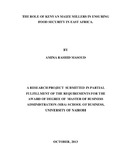| dc.description.abstract | International business helps in improving economic influence and living standards of
nations involved. International trade in agriculture has a potentially important role to play
in helping countries to meet their national food security objectives. However, trade may
also give rise to adverse effects on food security, particularly when it causes prices to be
unstable, and can adversely impact rural food security if it reduces real prices received by
domestic farmers. According to Cavusgil et al (2008 ) International trade and investment
are the most conventional forms of international business transactions. He further states
that firms pursue internationalisation strategies to seek opportunities for growth through
market diversification, to earn higher margins and profits and to gain new ideas about
products, services and business methods while at the same time seeking to develop
economies of scale in sourcing, production, marketing, research and development and to
invest in a potentially rewarding relationship with a foreign partner. International
business helps in improving economic influence and living standards of nations involved
.Firms can take advantage of regional economic integration that provides free trade,
lower costs and increased efficiency. Thomas states that the linkage between trade related
policy reforms and food security is of vital importance to many developing countries .The
instruments which most favor agriculture in the short and medium term are the
liberalization of the exchange rate and export regimes. One of the objectives of EAC is
the enhancement and participation of the private sector. Inadequate food exchanges and
trade between member states have dimmed the fight against food insecurity in the region.
There is a growing trend especially in developing countries to adopt and benefit from
international trade as a coping strategy to overcome food shortages. There has been no
study on the role of the private sector in ensuring food security in East Africa
Community. This was a descriptive survey which involved all major Kenyan maize
millers, the East African Community Secretariat/Ministry, Kenya Agricultural Research
Institute (KARI) and the Kenya Ministry of Agriculture. The respondents of this study
were the heads of milling and trade departments who responded to interview guides and
section heads of agencies who provided key information. Content analysis was employed
to analyse the qualitative data in the form of the interviewees’ views about the role of
private sector in ensuring food security in EAC. The summary of findings were that only
very few firms are members of any regional association such as the East Africa
Association of Maize Millers and have no plans for a merger or acquisition in any other
East African country. The role of the private sector in ensuring food security was when
large scale millers and retailers desist from raising their margins when grain is scarce in
local informal markets. The role of the private sector in ensuring food security also
included seasonal storage which however does not occur due to inadequate incentives to
store. The study recommends that policy makers and maize milling firms should
encourage more firms to pursue internationalization strategies. The study recommends
that a deeper insight into the role of the private sector in ensuring food security in East
Africa Community should be undertaken adequately. | en |

